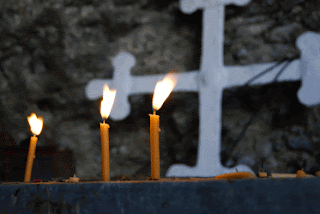It's interesting to study the scriptural account of the early church at worship in the Acts of the Apostles, which describes the first Christians drawing on the Psalms and other scriptures to celebrate God's love and power and to be strengthened and sustained in mission.
...In particular, of course, a church that is learning the habits of the royal priesthood will celebrate the sacraments -- those occasions when the life of heaven intersects mysteriously with the life of earth, not so that earth can control or manipulate heaven (that would be magic, not faith) but so that the story of heaven may become concrete, physical reality within the life of earth, catching up human beings within a world where all sorts of things make sense that don't otherwise, and all sorts of other things that might have appeared to make sense do so no longer.
All of this life of worship is something to be learned. Communities can grow into liturgy and sacraments, and can take delight in discovering that these things can become, as it were, habits of the community's heart as well as of the individual's. Shared worship is part of what it means when we compare Christianity to team sport. It is together that we are God's people, not as isolated individuals.
That being-togetherness does not, of course, mean uniformity. What counts is precisely the coming together of people who are quite unlike one another in everything except their commitment to the God we know in scripture and ultimately in Jesus.1
1. N.T. Wright, After You Believe: Why Christian Character Matters [Harper One: New York, NY; 2010] p. 223







